Ancestors – A Lineage of Scholars and Journalists
The family name “Bhashyam” was in fact a title given to T.B.Narasimhachar’s ancestors who were experts in expounding “Sribhashyam” of Ramanujacharya. Three generations of T.B.Narasimhachar’s ancestors contributed immensely to the establishment and growth of Kannada language journalism in the State of Mysore. D.V. Gundappa’s Vritta Patrike (a book on journalism) and Jnapaka Chitrashale (documentation of personalities he knew in the fields of art and literature in Karnataka in the 1800s) provide us with quite a bit of information on these forebears and their work.
________________________________________________________________________________________________________________
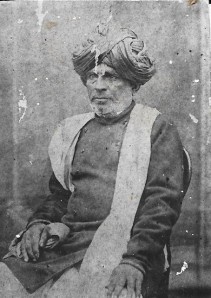
TBN’s great grandfather Bhashyam Tirumalachar, who started the first Kannada-English biweekly “Karnataka Prakashika” in 1865
The earliest known ancestor, Bhashyam Tirumalachar (aka Srisaila Deekshithar) was a respected Sanskrit scholar. He started the first bilingual (Kannada and English) weekly “Karnataka Prakashika” in 1865. He was later joined by his son Bhashyam Bhashyachar in this endeavour. DVG mentions that this journal was not only the first but perhaps the most popular during those times.DVG says Tirumalachar was also a philanthropist. Interestingly, Tirumalachar started and ran the first ever Sanskrit school in Bangalore from his home at Balepet. Later the school became part of the Tulasithota temple and even ran from a building in the front portion of the Tipu Sultan palace for some time. Finally the government took over the school and it became “Sri Jayachamarajendra Samskrit Pathashala”.
(TBN’s own admiration for this Renaissance personality was boundless: he had heard that Bhashyam Tirumalachar was a wrestler, multi-linguist, Bharatanatyam dancer, Yoga practitioner and an artist.)
________________________________________________________________________________________________________________
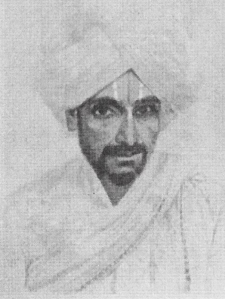
TBN’s grandfather Bhashyam Bhashyachar – TBN’s grandfather and publisher of Mysuru Vrttanta Bodhini
Tirumalachar’s son, Bhashyam Bhashyachar, had made his own mark in the field of Kannada language journalism. He is credited with publishing the first Kannada weekly from Mysore “Mysuru Vrittanta Bodhini” in 1859 under the royal patronage of Sri Mummadi Krishnaraja Wodeyar. He was also later appointed as the official Kannada translator for the government gazette where he worked till his demise. He had studied at the Wesleyan Mission School and had his high school education completed at Madras. He was proficient in Sanskrit, Kannada, Tamil, Telugu and English.
After Tirumalachar and Bhashyachar passed away, Bhashyachar’s son Venkatachar and T.C. Srinivasachar continued publishing this weekly till 1898.
________________________________________________________________________________________________________________
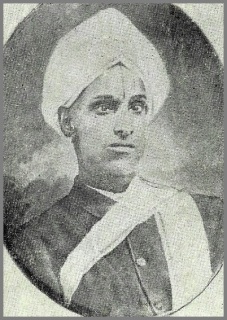
TBN’s father Bhashyam Ramachar, a Sanskrit MA from Allahabad University
TBN’s father Bhashyam Ramachar was the second son of Bhashyachar. He was a scholar with an MA degree in Sanskrit from Allahabad University and was held in high regard by D.V.Gundappa (Jnapaka Chitrashale by D.V.Gundappa Volume 1, Chapter “Bhashyam Devadi”). DVG became acquainted with him when he worked as associate editor of the English newspaper ‘Mysore times’ published from the “Irish Press” near Kottage (at the intersection of Chickpet and Akkipet). Ramachar was one of the managers of that press, since his family had a background in printing. Ramachar was employed at the Secretariat, but spent his spare time in examining books published by his ancestors, like “Samkshepa Ramayana”, “Sivanandalahari” and “Shukasaptati KathegaLu”, with the aim of publishing them in an improved form. DVG records getting acquainted with many noted personalities of that era when they visited Ramachar in the evenings to discuss and debate Vedantic philosophies and world issues.
________________________________________________________________________________________________________________
Scanned pages referring to TBN’s ancestors (Source DVG’s Vrittapatrika and Jnapakachitrashale. Click to start slideshow) –
-

-
Bhashyam Tirumalachar – the earliest documented ancestor published the first bilingual newspaper from Mysore. Reference: D.V.Gundappa’s ‘Vrittapatrike’
-

-
Bhashyam Bhashyachar Ref: DVG’s Vritta Patrike –
-

-
Karnataka Prakashika – The first Kannada/English Newspaper published by Bhashyam Bhashyachar . Ref: DVG’s Vritta Patrike
-
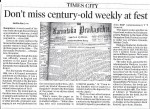
-
A Recent article on Karnataka Prakashika
-

-
JnapakaChitrashale – 1 – Bhashyam Devadi Intro
-

-
Jnapakachitrashale – 2 – Karnataka Prakashika
-

-
jnapakachitrashale – 3 – Karnatakaprakashika contents
-

-
jnapakachitrasale – 4 – Karnatakaprakashika and Tirumalachar
-

-
Jnapakachitrashale – 5 – TBN’s father Bhashyam Ramachar
-

-
jnapakachitrashale -6- TBN’s father Bhashyam Ramachar-2
________________________________________________________________________________________________
Early years

A young T.B. Narasimhachar
Tirumazhisai Bhashyam Narasimhachar was born on April 15, 1915 to Bhashyam Ramachar and Srirangamma (See “Ancestors” section for more details on Ramachar). TBN had an elder sister, Shantha. This compact family lived at their ancestral home along with the families of their paternal cousins, as a typical Indian joint family. Four generations of his family had lived at this residence opposite the Lakshminarasimhaswamy Temple on the Hospital road in Balepet, Bangalore . Unfortunately, TBN lost his father when he was merely twelve. It was then that an older cousin, T.B.Rangachar, who lived in the same house became his de facto guardian. Rangachar of Balepet was a renowned lawyer and became a major influence and decision maker during TBN’s formative years.
TBN graduated with a B.A. (English literature), from Maharaja’s College, Mysore and finished his formal education with a Bachelor of Law degree from Madras Law College (1938). Although he studied Law, due to family circumstances, he had to take up a clerical job at the Comptrollers’ Office (later Accountant General’s Office) in Bangalore.

TBN’s first wife, Rukmini, who was a singer and veena player
TBN was just 15 when he married Rukmini. She was a veena player and singer. After their marriage, the young couple along with TBN’s mother moved into their newly constructed house at Third cross, Malleswaram. This house, where he spent the rest of his life, would host many musicians and music programs in later years.
Family
At the time his first wife, Rukmini, passed away in 1957, TBN was a father of two daughters (Aravinda, Padmini) and a son (Satyanarayana). He had another son, Srinivas, through his second wife Pattammal. Although none of them is in the music profession, they continue to be great “rasikas” of music and have inherited his eclectic love and appreciation of literature and the arts.

Wife Pattammal with TBN
Personality
TBN was a man of simple and disciplined life style. For someone associated with the field of performing arts, he was uncharacteristically free of habits. He had inherited a sturdy physique at 5 ft. 11 in. and trained for years at Prof. K. V.Iyer’s gymnasium in his youth.For most of his very active 73 years of life he was in good health, largely avoided Allopathic medication and preferred Ayurveda when in need of some medication. He was a connoisseur of good South Indian vegetarian food and North Indian sweets! His early mornings always included some reading from the Bhagavad-Gita or the Ramayana in his puja room at home. He was more drawn to the spiritual and philosophical aspects of religion and wasn’t keen on visiting temples or participating in religious rituals.
His extroverted nature, a cheerful attitude, outspokenness and an uncomplicated ego helped him stay an easy person to approach. He was particularly popular with musicians and friends who were sometimes several decades younger than him – they loved having uninhibited intellectual discussions on wide-ranging topics with him!
An Environment of Music
At a very young age, TBN developed a keen interest in the arts, especially literature, music and cinema. Eventually when he started working, it was natural for him to devote his after-office hours to pursuing his interests. He became an active member and a regular to the classical Carnatic music concerts at Gayana Samaja at Shankarapuram as well as Rama Seva Mandali at Chamarajapet.
It was during this time that he began interacting with many of the well-known musicians of those times. Belakavadi Varadaraja Iyengar was a close friend from whom TBN learnt about the intricacies of Carnatic music. Another such friend was C.P.Rangaswamy Iyengar(a disciple of Kanchipuram ‘Nayana’Pillai) who introduced him to the greatness of musicians of previous generations. TBN’s wife, Rukmini, was well-trained in veena and vocal music, but had never performed on stage herself. She would learn new songs all the time and write them down in her notebook. Her musical background was very helpful in continuing TBN’s informal music education. All of this made him develop a deeper understanding of music, although he himself did not have a “singing voice”.
At his work place, the Accountant General’s office in Bangalore, he volunteered as the Secretary of the Cultural Committee and organized plays, poetry readings, light music concerts and Kavya Vachana (an art form exclusive to Karnataka). He was elected as the Cultural Director (a member of the Board of Directors) at Malleswaram Co-Operative Bank and helped organize similar cultural events there.
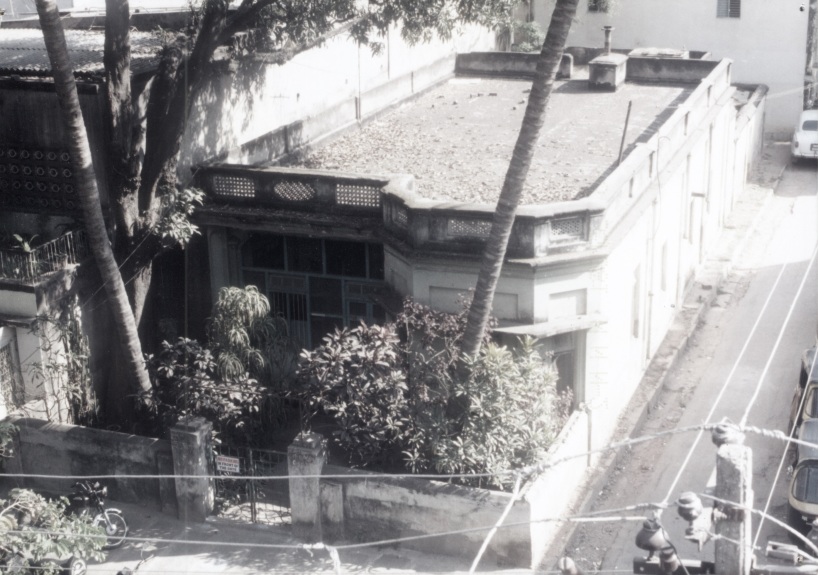
Above: TBN’s residence at Third Cross, Malleswaram, Bangalore where he lived for most of his adult life. Through the late 1950s till the 70s, many legendary out-of-town musicians like Ariyakkudi Ramanuja Iyengar, Maharajapuram Viswanatha Iyer, T.R.Mahalingam, M. Chandrasekaran, Vellore Ramabhadran would stay briefly with TBN and his family here. Some evenings, there would be informal chamber concerts in the living room, for a privileged audience of neighbours, friends and walk-in strangers!
Foray into Writing
T. B. Narasimhachar’s friend, P.B.Srinivasan was the editor of the Kannada newspaper ‘Thaai Naadu’. He would often discuss the world of music with TBN. He persuaded TBN to write about music and thus was born a regular column called ‘Music and Musicians’ in his newspaper. In the following decades, TBN continued to write about music and musicians in many newspapers and magazines of Karnataka.
After a few years, when TBN was invited to write music reviews for a leading Kannada daily, ‘Samyukta Karnataka’, he chose to write under the pen name ‘Saragrahi’(Sanskrit for Connoisseur). Subsequently, he began reviewing live concerts for another newspaper ‘Kannada Prabha’ along with a column about the ‘Musicians of Mysore/Karnataka’. Being well-versed in English, he then introduced the same column in English in The Indian Express. This would include columns about the legendary musicians from the past too.
He showcased young talent in a series of columns in The Indian Express titled “Talent search”. This was simultaneously published in Kannada Prabha as “Pratibha Pradarshana”.
TBN conceived of and brought out a little magazine called ‘Nadopasana’ for the members of the Malleswaram Sangeetha Sabha. Apart from the following month’s programmes, the magazine would include short articles about music and musicians, often by guest writers.
Self-taught Archivist and Historian
Indians in general are not known to value or preserve history, let alone document contemporary events and personalities of importance. TBN was a clear exception! His deep interest in carnatic music extended to the history of musicians as well. Apart from many newspaper articles about musicians of the past and present, he also wrote about the History of Malleswaram Sangeetha Sabha in the magazine Nadopasana. He was an avid photographer and had captured photos of many illustrious musicians himself. He also maintained scrap books of his own writings (which is available with us in the family). He had collections of music books, photos, gramophone records, music recordings that he preserved with great care. Out of his own interest, he created meticulously documented albums of his favourite musicians across some four ‘musical’ generations (Reference: Prof. T.S. Satyavati), spanning most of the 20th century. The records were usually in the form of photos/articles with his comments below. He would show his records to youngsters in the field of music and music journalism and encourage them to do the same. Also, to ensure that these end up in the right hands (not necessarily family!), he gave away some of his collections to deserving youngsters in the music field. He donated some 24 bound volumes of his ancestors’ journalisitc works (Mysuru vrttanta bodhini, Karnatka Prakashika) to Gokhale institute way back in the 60’s.
The World of Words and a Range of Notes
Right from his childhood he was a voracious reader of English and Kannada literature. He could also speak in Tamil, Telugu and Hindi. Apart from his love for Shakespeare, Oliver Goldsmith, Oscar Wilde and others, he was also an admirer of the writings of British philosopher Bertrand Russell; he would pepper his conversations with appropriate quotes from many such writers. His eclecticism allowed him to enjoy Western Classical music and Jazz as well.
Cinema Love
TBN also loved cinema. Right from the 50’s, he watched Hollywood movies as well as Tamil, Hindi, Kannada, Malayalam and Bengali movies. As a young man, he even wrote to some of his favourite actors and got personally autographed photographs from them! After retiring from his job, he enrolled himself with a couple of fledgling film societies in Bangalore and began watching World Cinema. He would make the effort to attend the weekly French and German film screenings at the Alliance Francaise and the Max Mueller Bhavan. He would manage to watch several movies a day at the international film festivals in Bangalore. His taste ranged from the classical to the avant-garde and he was particularly enthralled by European cinema. He would discuss the nuances of serious cinema with the same passion as he would bring to classical music.
His Later Years

He dedicated most of his retirement years (1973-1988) to writing about music, perhaps inspired by his ancestors. It was during this time that he wrote many music reviews and articles for prominent newspapers and started ‘Nadopasana’, a monthly bulletin for members of the Malleswaram Sangeetha Sabha. He was often part of the AIR audition committee. He was commissioned by the Karnataka Sangeetha Nritya Academy to compile and edit a series of volumes on the various artistes of Karnataka including “Namma Sangita Kalavidaru“., “Namma Nritya Kalavidaru” and “Namma Sugama Sangita Kalavidaru” as well as “Namma kalavidaru” for Purandara Bhavana.
He was also a close consultant to K. K. Murthy, the person who was the force behind getting the famous violin-shaped auditorium, Chowdiah Memorial Hall built. The family remembers K. K. Murthy visting them often for long discussions during the time that the hall was being proposed and constructed.
One of his life long wishes was to pass away without having to suffer through prolonged illness and pain of any sort. On afternoon of Nov 23, 1988, he finished proof-reading the printer’s galleys of the last of a series of biographies which he was editing for the Sangeetha Nritya Academy, put down his approval signature and passed away right then due to a cardiac arrest, with literally a pen in his hand!
Awards
For his contribution to the field of music criticism, he was awarded the ‘Karnataka Kala Tilaka’ award in 1985 by the Govt of Karnataka. He also received the “Kannada Rajyotsava Award”. Many other organizations honored him over the years too, documentation on which is unfortunately not available with us.
-

-
Karnataka Kala Tilaka Citation
-

-
Receiving the “Karnataka Kala Tilaka” award for his contribution to Music criticism
-

-
TBN’s Rajyotsava Award mentioned in Nadopasana bottom right – along with other announcements
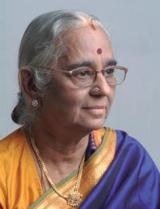 Our family members met with Sangita Kalanidhi Smt. R. Vedavalli at Chennai and spoke about the time when she was in Bangalore and the circumstances that led to her becoming a professional musician. These are her memories of that time:
Our family members met with Sangita Kalanidhi Smt. R. Vedavalli at Chennai and spoke about the time when she was in Bangalore and the circumstances that led to her becoming a professional musician. These are her memories of that time:





























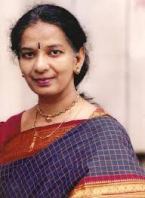
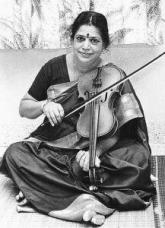

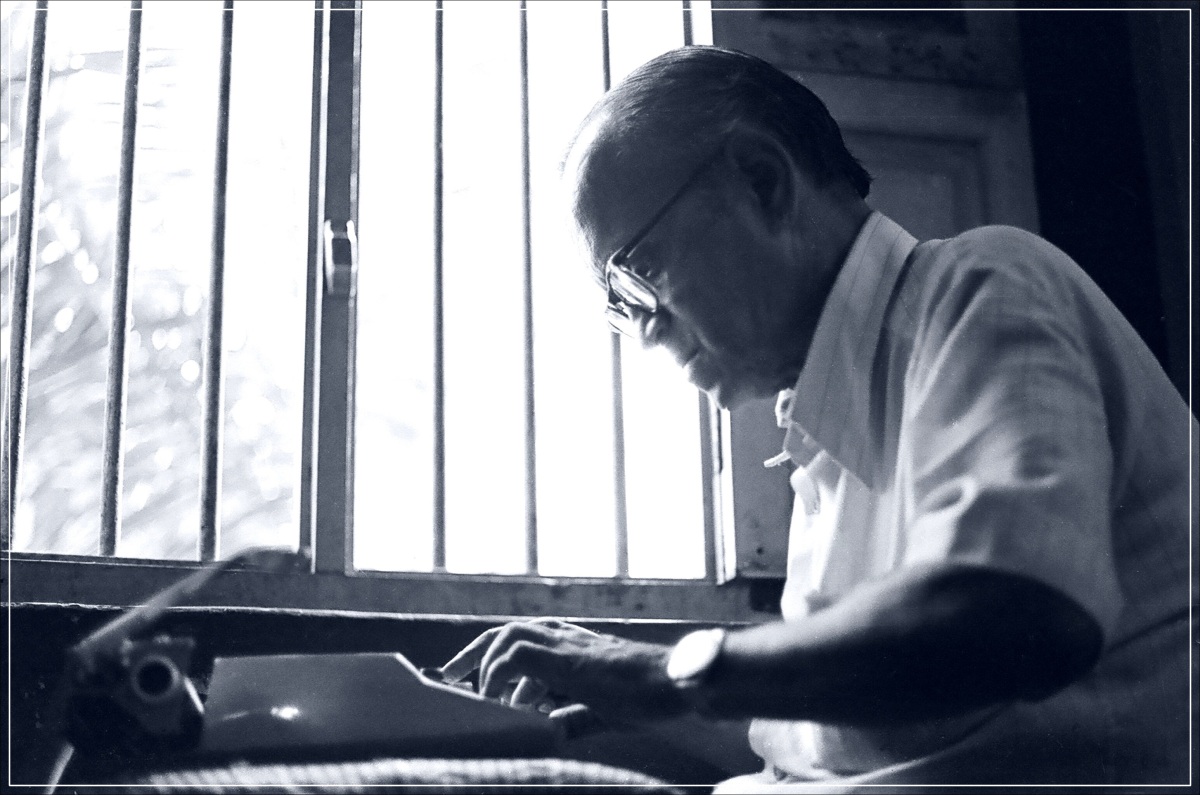
Recent Comments